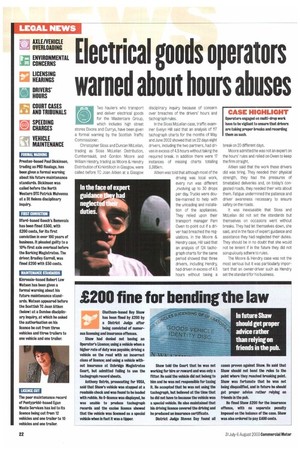Electrical goods operators warned about hours abuses
Page 22

If you've noticed an error in this article please click here to report it so we can fix it.
Two hauliers who transport and deliver electrical goods for the Mastercare Group, which includes high street stores Dixons and Currys, have been given a formal warning by the Scottish Traffic Commissioner.
Christopher Sloss and Duncan McLellan, trading as Sloss McLellan Distribution, Cumbernauld, and Gordon Moore and William Hendry, trading as Moore & Hendry Distribution of Kirkintilloch in Glasgow, were called before TO Joan Aitken at a Glasgow disciplinary inquiry because of concern over breaches of the drivers' hours and tachograph rules.
In the Sloss McLellan case, traffic examiner Evelyn Hill said that an analysis of 117 tachograph charts for the months of May and June 2002 showed that on 22 days eight drivers, including the two partners, had driven in excess of 4.5 hours without taking the required break. In addition there were 17 instances of missing charts totalling 3,385km.
Aitken was told that although most of the driving was local work, every run was different ,involving up to 30 drops per day. Trucks were double-manned to help with the unloading and installation of the appliances. They relied upon their transport manager Pam Owen to point out if a driver had breached the regulations. In the Moore & Hendry case, Hill said that an analysis of 124 tachograph charts for the same period showed that three drivers, including Hendry, had driver in excess of 4.5 hours without taking a break on 20 different days.
Moore admitted he was not an expert on the hours' rules and relied on Owen to keep the firm straight.
Aitken said that the work these drivers did was tiring. They needed their physical strength, they had the pressures of tirnetabled deliveries and, on today's congested roads, they needed their wits about them. Fatigue undermined the patience and driver awareness necessary to ensure safety on the roads.
It was inexcusable that Sloss and McLellan did not set the standards but themselves on occasions went without breaks. They had let themselves down, she said, and in the face of expert guidance and assistance they had neglected their duties. They should be in no doubt that she would not be lenient if in the future they did not scrupulously adhere to rules.
The Moore & Hendry case was not the most serious but rt was particularly important that an owner-driver such as Hendry set the standard for his business.
































































































































































